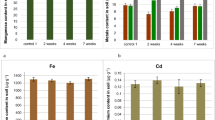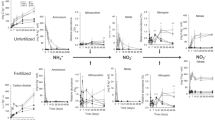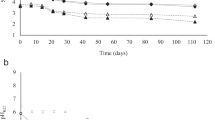Abstract
FULL results of our investigation into the effect of treatment with ammonium sulphate on the calcium economy of a tea soil will be published elsewhere1; but certain preliminary observations can now be made. The soil under study, which is typical of the tea soils of north-east India, can be described as a highly acid loamy sand of alluvial origin, having pH about 4.5 and a low calcium content.
This is a preview of subscription content, access via your institution
Access options
Subscribe to this journal
Receive 51 print issues and online access
$199.00 per year
only $3.90 per issue
Buy this article
- Purchase on Springer Link
- Instant access to full article PDF
Prices may be subject to local taxes which are calculated during checkout
Similar content being viewed by others
References
Gokhalé, N. G., and Bhattacharyya, N. G., Emp. J. Exp. Agric. (in the press).
Russell, Sir John, rev. Russell, E. W., “Soil Conditions and Plant Growth”, 8th edit., 119 (Longmans Green, 1950).
Pierre, W. H., J. Amer. Agron., 20, 254 (1928).
Truog, E., “Mineral Nutrition of Plants”, 38 (Univ. of Wisconsin Press, 1951).
Andrews, W. B., and Cowart, R., Proc. S.S.S. Amer., 4, 275 (1939).
Author information
Authors and Affiliations
Rights and permissions
About this article
Cite this article
GOKHALÉ, N. Rate of Calcium Loss resulting from Ammonium Sulphate Treatment of a Tea Soil. Nature 181, 426–427 (1958). https://doi.org/10.1038/181426b0
Issue Date:
DOI: https://doi.org/10.1038/181426b0
Comments
By submitting a comment you agree to abide by our Terms and Community Guidelines. If you find something abusive or that does not comply with our terms or guidelines please flag it as inappropriate.



